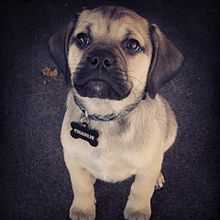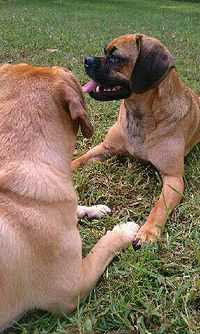Puggle
 A Puggle | |
| Breeds | Crossbreed of Beagle and Pug |
|---|---|

Puggle is the name for a crossbreed dog with a beagle parent and a pug parent. The name Puggle is a portmanteau, following a naming trend in "designer dog"[1] crossbreeding.
History
Wisconsin breeder, Wallace Havens, bred the first puggle in the 1980s.[2] Havens coined the name "puggle" and was the first to register the breed with the American Canine Hybrid Club, an organization that tracks mutt dogs. Although Havens was the first to officially breed a puggle, the history of puggles dates back to the 1980s when U.S. breeders experimented with creating new dogs.[3] By 2000, puggles were being sold commercially to pet owners wanting to own a different, distinctive dog.
The American Kennel Club, United Kennel Club, and Canadian Kennel Club do not recognize puggles as a dog breed. Puggles are considered a designer dog.[4]
Description
Puggles grow to a mature weight of 15 to 30 pounds with a shoulder height of 8 to 15 inches.[5] They can be a variety of colors and patterns depending on the characteristics inherited from the parent breeds. The most common colors are tan, fawn, or black. Mixed colors are not commonly found. They may have a short nose like the pug, or a longer snout like a beagle. The colors, body shape, ears, etc. will vary. The temperament of the Puggle generally combines the active and inquisitive nature of the Beagle with the companionable nature of the Pug. These two psychographic traits make it a companion breed with lower required exercise needs.
Health
Both Beagles and Pugs can suffer from cherry eye and epilepsy. Puggles can also inherit hip dysplasia from one or both of their parents. Some Puggles can suffer from food and environmental allergies. If the allergies are serious enough, a special diet or steroid shots may be needed.
Puggles who have longer snouts like the Beagle parent are at a reduced risk of respiratory problems. However, Puggles can suffer from the respiratory ailments commonly found in Pugs (a breed known for being brachycephalic), which can be problematic. One common, nonthreatening respiratory ailment that Puggles sometimes suffer from is reverse sneezing (also called backwards sneezing or inspirational paroxysmal respiration).
References
| Wikimedia Commons has media related to Puggle. |
- ↑ http://animal.discovery.com/tv-shows/dogs-101/videos/designer-dogs.htm
- ↑ "The Modern Kennel Conundrum". The New York Times. p. 1. Retrieved 5 June 2013.
- ↑ The Modern Kennel Conundrum, The New York Times, Feb. 4, 2007.
- ↑ "Dogs 101 - Designer Dogs". Discovery Communications, LLC.
- ↑ "Puggle". vetstreet.com. Retrieved 5 June 2013.